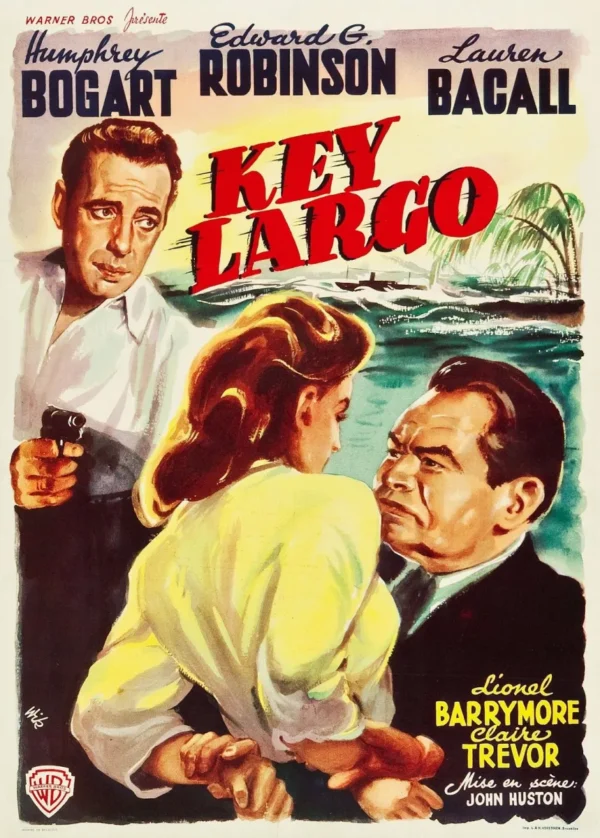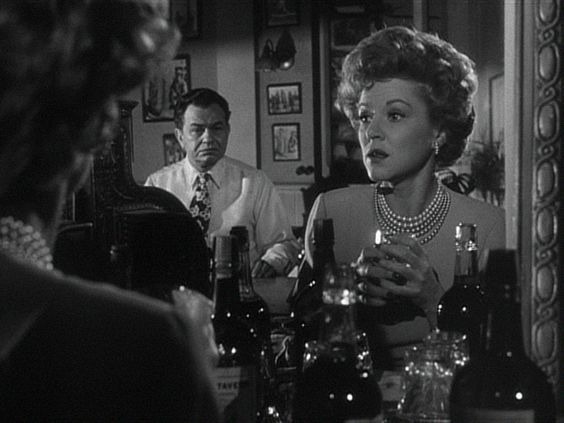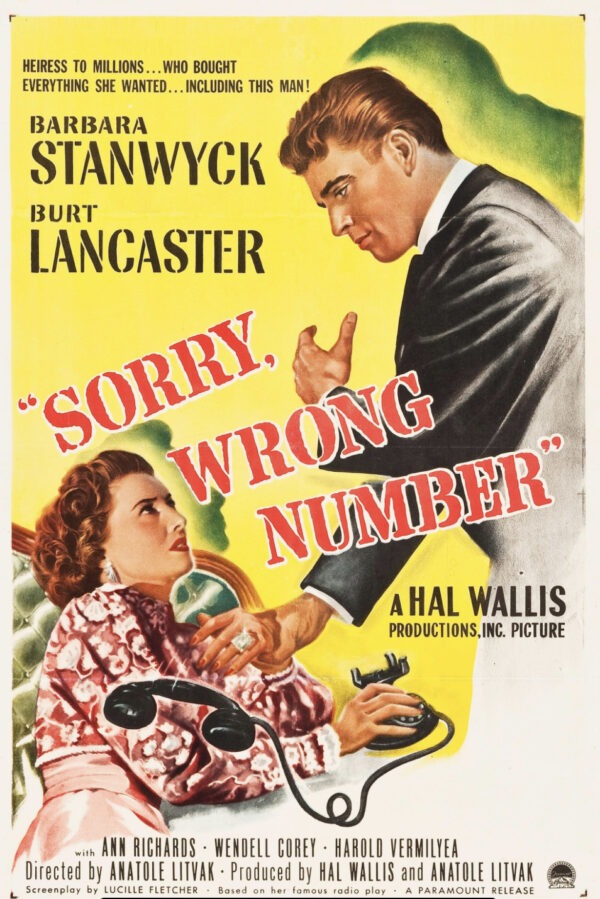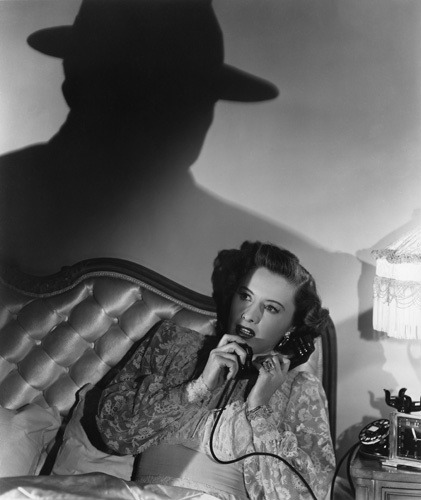It’s that most wonderful time of year again, Faustketeers. Time for Noir City Hollywood! Only this time, it’s a different time of year, in a different part of the city and I’m not even in that city anymore.
As most of you know, I’ve been splitting my time between LA and Gig Harbor, WA to help out my elderly mom. This year I’ve been more up than down and it’s probably going to continue like that until I’m up here full time.
If I were in LA right now, I’d be bitching about having to haul my ass down the dreaded 405 to the Aero Theater in Santa Monica. But I’d still do it, gladly. Because I miss the movies, and all my fellow Noirhounds.
But, in life as in Film Noir, you can’t always get what you want. So with that in mind, I’m playing the Noir City Home Game again, and I hope you’ll all play along!
Last night was opening night and featured a suspenseful and claustrophobic double bill of stage/radio play adaptations that make the most out of minimal locations.
First up KEY LARGO.

I’ve seen this crackerjack flick dozens of times, and would even argue that it’s my favorite pairing of Bogey and Bacall, yet somehow I don’t seem to have written it up yet. Or if I have, it’s long lost in the muck of the early internet. Go figure. Anyway, I love this film and if you have somehow managed to go this long without seeing it, you need to remedy that shit pronto.
A world-weary veteran (Bogart) makes his way down to Key Largo to pay respects to the family of his war buddy, who was killed overseas. When he arrives at their shabby little hotel, he discovers it’s closed for the summer but yet still occupied by a mysterious “fishing party” composed of sweaty and irritable gangsters. His buddy’s disabled father (Barrymore) and young widow (a fresh, tan and decidedly un-fatale-like Bacall) welcome him and encourage him to stay.
But there’s a storm coming, in more ways than one.

Ok, so yeah Bogie and Bacall are terrific together, of course. The natural, real-life chemistry between the now married duo is there, but it comes across as more subdued and complex than in previous cinematic pairings. Edward G. Robinson is also unsurprisingly terrific as the aging mob boss Johnny Rocco, exiled in disgrace but still clinging to dreams of being back on top, but the real star of this movie is Claire Trevor as the broken songbird Gaye Dawn.

Trevor won a well-deserved Best Supporting Actress Oscar for this role and the scene where Rocco forces her to sing for a desperately needed drink is the emotional center of the movie. Director John Huston famously forced the actress to sing with no rehearsals or accompaniment and used the very first take he shot, resulting in an unforgettably raw and poignant performance. The song, “Moanin’ Low” is about a woman whose man treats her mean, and over the course of her shaky, off-key and painfully mediocre rendition, we see her slowly realize that her life has become exactly what she used to sing about back when she was a rising star.
Everyone except Bacall’s young widow is a shadow of their former selves in this flick. Bogart’s cynical and disillusioned soldier, Robinson’s ornery old lion, Barrymore’s elderly and disabled character and even the hotel itself. And for all the meditation on what it really means to be a hero and whether or not it’s even worth trying, it’s Gaye Dawn’s surprising hero turn that feels the most meaningful.
There is a pretty cringeworthy subplot involving indigenous Seminole people who are portrayed as child-like and subservient, existing only to reflect the saintly/evil nature of the main characters. You’d think that if anyone knew how to survive hurricanes in the Florida Keyes it would be the people who had lived there for thousands of years, but apparently only big white men know about storm shutters! Anyway that kind of thing is unfortunately typical of the time period in which this movie was made, so you’ll need to take it with an appropriately-sized grain of Film Noir salt. As always, your milage may vary.
On to the next feature on our Shut In double bill, SORRY, WRONG NUMBER.

Barbara Stanwyck plays Leona, a middle-aged heiress suffering from what would now be recognized as a severe panic disorder. Bedridden and alone in her plush New York penthouse, she’s desperately trying to reach her AWOL husband (Burt Lancaster) when she gets accidentally connected to a call in progress. The unknown voices on the line are describing their plan to murder a woman at 11:15 that night. So starts our ticking clock as Leona fights to be taken seriously by anyone in authority, all the while being dragged deeper and deeper into a twisted conspiracy. And because this is Noir City, we all know that her past actions will come back to bite her.

This story has a lot in common with Hitchcock’s REAR WINDOW, but the thing that makes it more interesting to me is the same thing that allows other people to dismiss it as a melodramatic “Woman’s Picture.” It’s the fact that it takes on and handily dissects the cliche of the hysterical older woman, over-wrought, untrustworthy and hormonally unbalanced. Many other domestic suspense stories center around a beautiful, saintly young girl who is driven to hysteria by forces beyond her control, but in this flick our protagonist is more complex, nuanced and gray-shaded. She’s a cruel and selfish manipulator who has made bad choices for questionable reasons and is now being forced to confront the consequences of those choices, yet we still find ourselves sympathizing and ultimately rooting for her.
In fact nobody is entirely innocent in this one, which in my mind puts it squarely in the Film Noir category. Not her doctor, who lies to her about her condition, or her controlling father, who prefers her weak and dependent. Especially not her ambitious trophy husband who can’t seem to shake the sense of unworthiness and class-conscious shame he carries over from his impoverished childhood. Maybe her pretty childhood friend who tries to help despite losing Burt Lancaster to her, but that doesn’t take away from the overall moral ambiguity and deliciously pitch black ending.
There are things to gripe about if you’re feeling nit-picky. The complicated, Breaking Bad-esque plot feels padded at times and the flashbacks within flashbacks often seem cumbersome and inorganic, but none of that should stop you from checking this flick out. Especially since it’s available to stream on the Internet Archive.
Next up, we have a triple header, starting with HOLLOW TRIUMPH and then a Theater Noir double bill of A DOUBLE LIFE and THE VELVET TOUCH. Watch along at home with me tonight if you can and then tune in tomorrow for more of my cogent and deeply intellectual write ups!